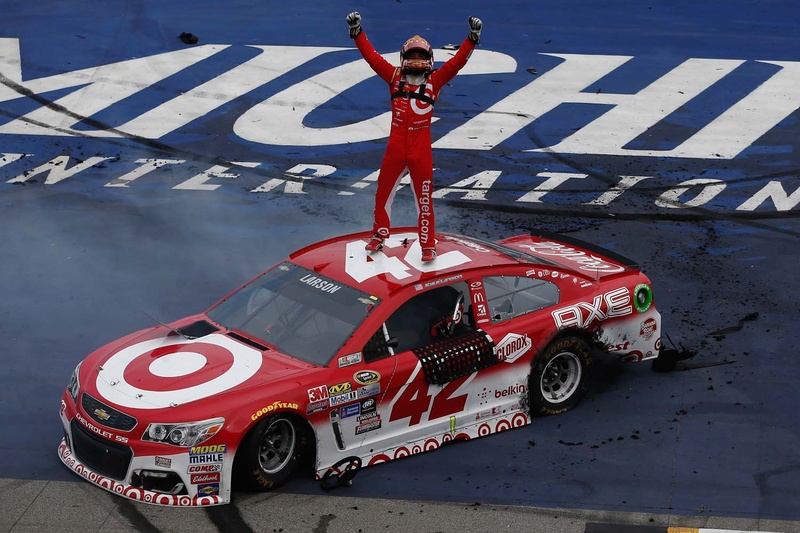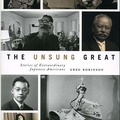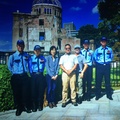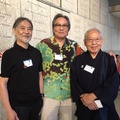In August 2016, Kyle Miyata Larson made sports history by becoming the first Japanese American driver to win the NASCAR Sprint Cup Series—NASCAR’s top level of racing.
Larson began racing at the age of seven. Today the 24-year-old is already an accomplished professional in racing, having previously won multiple other NASCAR titles. His recent Sprint Cup win was seen as a victory not only for him as an individual driver but also for diversity in the sport. Larson’s mother is Japanese American, and her parents were unjustly incarcerated during World War II in ethnic concentration camps.
Earlier in his career, Larson participated in NASCAR’s Drive for Diversity (“D4D”) professional development program. The program’s purpose is to attract minorities and women to auto racing, as drivers and in other related roles. Larson became the first graduate of the D4D program to win at NASCAR’s highest series.
Discover Nikkei had the pleasure of engaging Larson for a brief interview.
* * * * *
Discover Nikkei (DN): For those of us not familiar with the details of the D4D program, can you explain what it is, how you got involved with it, and what difference you think it made to you?
Kyle Larson (KL): The D4D program, through Rev Racing, offers opportunities for ethnic minorities to get involved in racing on the crew and driver side. I got involved with Rev Racing in 2013 after I was signed with Chip Ganassi Racing, so I was already with a NASCAR team, but the program helped me get some track time and helped out Chip financially by providing me with a place to race. I hadn’t really run any races on pavement, so the seat time was important to get before I moved up to the XFINITY Series.
DN: Have you had time to reflect on how this is meaningful to you and your family? For your family to go from that low point of being imprisoned just because of their ethnicity, to your being a champion in NASCAR—one of the most all-American of sports…that seems like a huge step forward in just a couple of generations.
Well, I’m not a champion in NASCAR, yet. I’ve only won one race. I really don’t know a whole lot about the time my grandparents spent in an internment camp, so that experience in their life isn’t a big part of my family’s identity. Growing up I didn’t feel any different from my friends or the other kids I raced against, and was never treated any differently. I think what’s impressive with me is only a handful of years ago I was racing on dirt tracks and now I’m starting Sprint Cup Series races.
DN: People who stand out as being the first to break through a social barrier sometimes also find themselves under an uncomfortable type of scrutiny or facing negativity. Have you had to face any prejudices along the way?
KL: Definitely not, and I don’t think there’s any prejudice or scrutiny towards other drivers in NASCAR because of their ethnicity.
DN: In your view, why is diversity important for auto racing?
KL: Diversity is important for every sport, I think. I want to compete against the best drivers out there, and the fans want to see the best drivers competing each weekend. It’s neat that I’m maybe playing a small role in drawing a more diverse crowd to the track, and I think it’s important for our sport to continue to grow the fan base.
DN: Did you have any role models who influenced you? If so, who and why?
KL: My dad is definitely one of my biggest role models. He’s always been there to support me and give me advice, both on and off the track. From the time I started racing, both he and my mom taught me to be respectful of other competitors and encouraged me to have a good attitude regardless of what happened on the track. Those qualities continue to help me in my career and have definitely helped me earn the respect of veterans in NASCAR.
DN: You’re driving at really high speeds. How much fear do you have during a given race? And now that you’ve recently become a dad, has that affected how you view the sport?
KL: I don’t race with any fear. I think if you’re racing with fear, or doing anything else, you’re going to make mistakes and not give it your all. NASCAR also has done a great job of making our cars and equipment as safe as possible, so you know you’re protected on the track. Being a dad has been an awesome experience. It’s cool to see how much Owen is learning and growing every day. He hasn’t changed my view of the sport really; I still go out and race hard, but it does help me shake off a bad day quicker once I see him. He’s always smiling and doesn’t know or care that I maybe didn’t have a great day.
DN: You started so early and you’ve already become a seasoned driver at a young age. For those of us who aren’t sophisticated in racing, can you describe the ways in which you think you’ve improved your skills?
KL: I think I’ve gotten more patient since my rookie season. The racing I grew up doing had a lot fewer laps for each event, so I’ve had to learn to pace myself in NASCAR with two- and three-hundred-lap races. I’m still aggressive in my driving style, but I’m better at managing that throughout a whole race.
DN: What have been some of the most interesting or unexpected comments or reactions that you have received from racing fans? Any stories that you can share?
KL: I can’t think of anything in particular, but it’s always cool at the track when a kid comes up wearing my hat or T-shirt and wants a picture or autograph. I can remember being at sprint car races as a kid doing the same thing, so it’s neat to see how excited they get when they meet me. It’s also amusing when I have fans come up to me asking for an autograph, but call me by the wrong name or have me mixed up with another driver.
DN: Is there anything else you’d like to share with our readers?
I just want to encourage everyone to tune in and catch a NASCAR race. Pick a driver or two, hopefully me, to cheer for and maybe one to root against; I think that can make watching the race a little more interesting for a new fan.
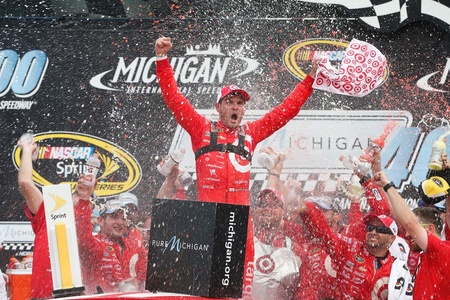
© 2016 Japanese Amrican National Museum


